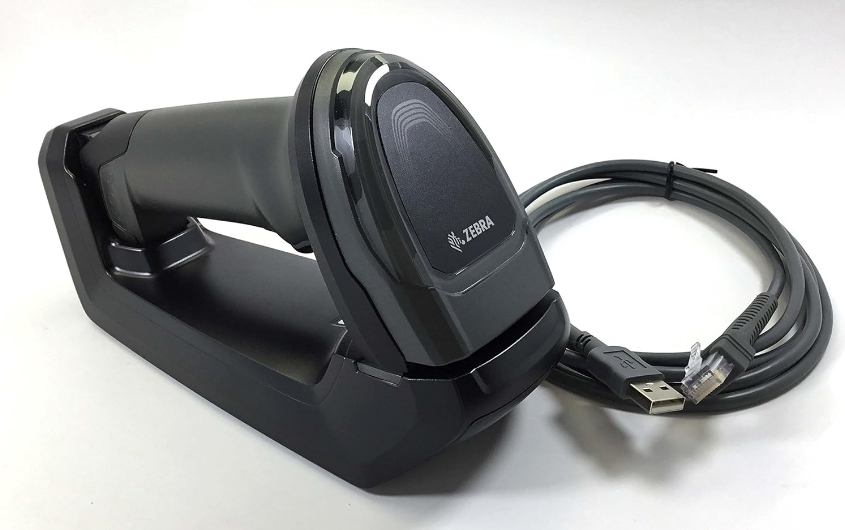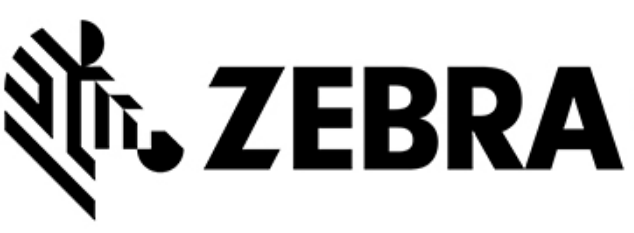
Zebra DS8178 Handheld Scanner-Imager
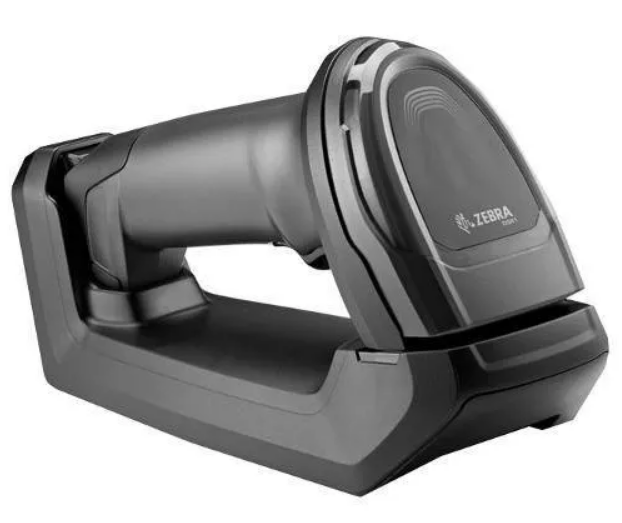
Scanner Features
NOTE: Standard range digital scanner pictured. Refer to the Product Reference Guide for detailed information.
Aiming – Right/Wrong
Cradle Insertion
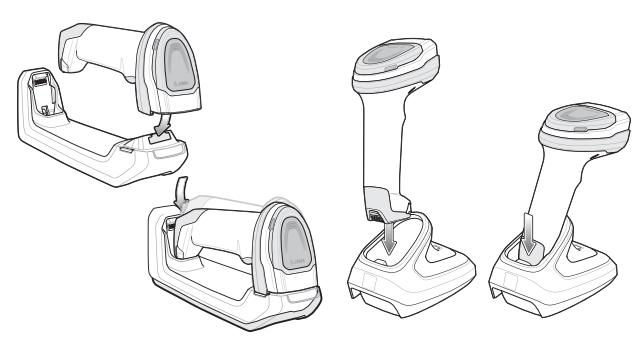
Battery/Power Cap Insertion/Removal
IMPORTANT PowerCap requires firmware version CAACXS00-004-R00 or later. NOTE: It is recommended to fully charge the battery/PowerCap before use.
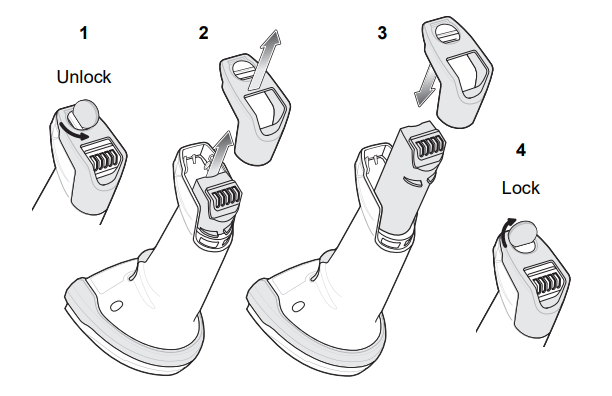
Cradle Cable Connection
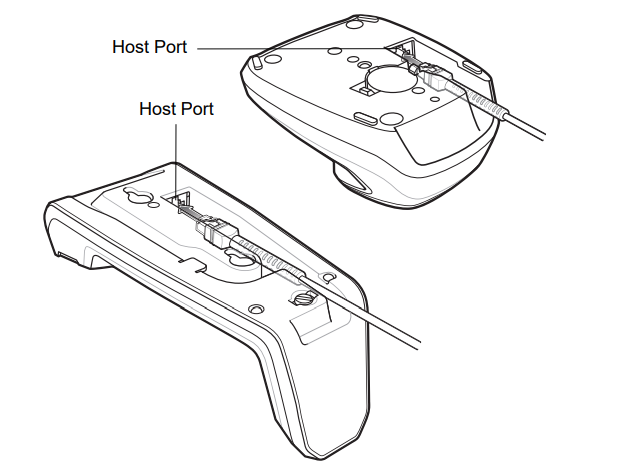

Connect Host Interface
NOTE: Cables may vary depending on configuration
USB

Scan ONE of the bar codes below. The interface cable automatically detects the host interface type and uses the default setting. If the default (*) does not meet your requirements, scan another host bar code below.
RS-232

Scan ONE of the bar codes below. The interface cable automatically detects the host interface type and uses the default setting. If the default (*) does not meet your requirements, scan another host bar code below.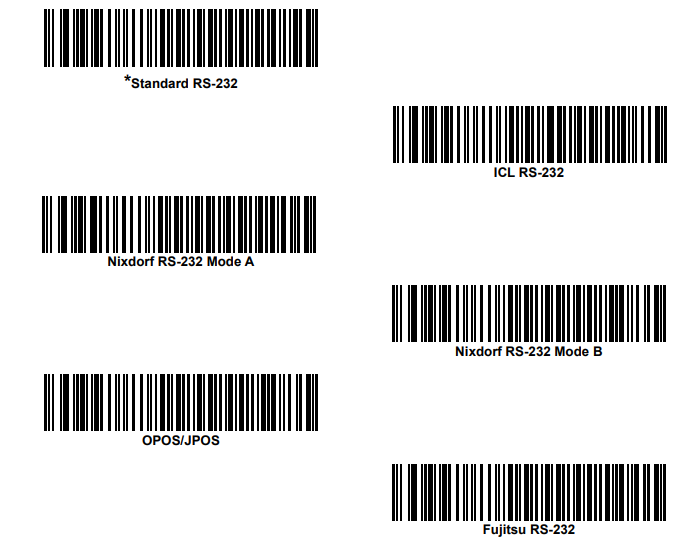
Keyboard Wedge

Scan ONE of the bar codes below. The Auto-Host Detect Cable feature automatically detects the host interface type and uses the default setting. If the default (*) does not meet your requirements, scan the IBM PC/AT and IBM PC COMPATIBLE bar code below.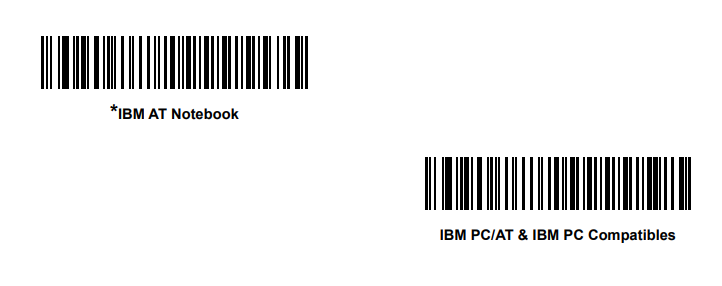
IBM 46XX
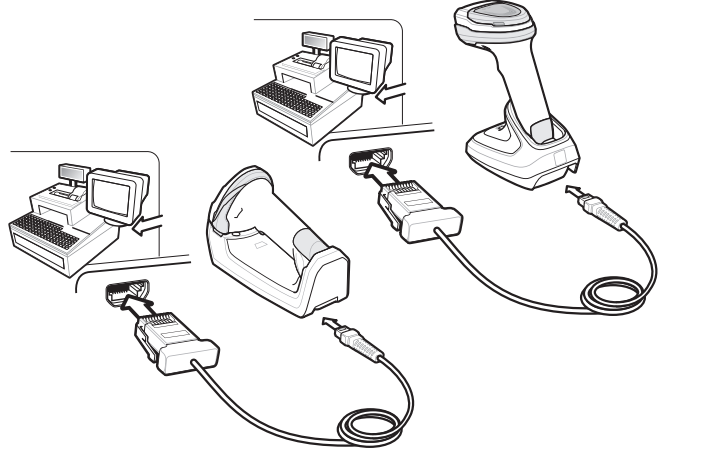
Scan ONE of the bar codes below. The Auto-Host Detect Cable feature automatically detects the host interface type, but there is no default setting. Scan one of the bar codes below to select the appropriate port.
Useful Bar Codes
Set Defaults
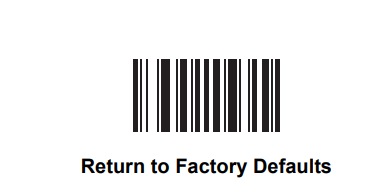
Add a Tab Key
To add a Tab key after scanned data, scan the bar code below.
Add an Enter Key
To add an Enter key after scanned data, scan the bar code below.
USB Caps Lock Override

Night Mode with Vibrate
Beeper Indications

LED Indications

123Scan
123Scan is an easy-to-use, PC-based software tool that enables rapid and easy customized setup of a scanner via a bar code or USB cable. For more information, visit: www.zebra.com/123Scan.
Utility Functionality
- Device configuration
- Electronic programming (USB cable)
- Programming bar code(s)
- Data view – scan log (display scanned bar code data)
- Access asset tracking information
- Upgrade firmware and view release notes
- Remote management (SMS package generation).
Troubleshooting


RECOMMENDED USAGE GUIDE – OPTIMUM BODY POSTURE

Regulatory Information
For devices with Symbol, or Symbol Technologies Inc., etc., on the Manufacturing Label and for devices manufactured at Reynosa, or any other Zebra factory facilities: This device is approved under Zebra Technologies Corporation. This guide applies to Model Number: DS8178. All Zebra devices are designed to be compliant with rules and regulations in the locations where they are sold and will be labeled as required. Local language translations are available at the following website: www.zebra.com/support. Any changes or modifications to Zebra equipment, not expressly approved by Zebra, could void the user’s authority to operate the equipment.
Health and Safety Recommendations
Ergonomic Recommendations
Caution: In order to avoid or minimize the potential risk of ergonomic injury, follow the recommendations below. Consult with your local Health & Safety Manager to ensure that you are adhering to your company’s safety programs to prevent employee injury.
- Reduce or eliminate repetitive motion
- Maintain a natural position
- Reduce or eliminate excessive force
- Reduce or eliminate vibration
- Perform tasks at correct heights
- Keep objects that are used frequently within easy reach
- Reduce or eliminate direct pressure
- Provide adjustable workstations
- Provide adequate clearance
- Provide a suitable working environment
- Improve work procedures.
Bluetooth® Wireless Technology
This is an approved Bluetooth® product. For more information or to view the End Product Listing, visit www.bluetooth.org/tpg/listings.cfm.
Wireless Device Country Approvals
Regulatory markings, subject to certification, are applied to the device signifying the radio(s) is/are approved for use in the following countries: United States, Canada, Japan, China, South Korea, Australia, and Europe. Please refer to the Declaration of Conformity (DoC) for details of other country markings. This is available at www.zebra.com/doc.
Warnings for Use of Wireless Devices
![]() Safety in Hospitals
Safety in Hospitals
Wireless devices transmit radio frequency energy and may affect medical electrical equipment. Wireless devices should be switched off wherever you are requested to do so in hospitals, clinics, or health care facilities. These requests are designed to prevent possible interference with sensitive medical equipment.
Pacemakers
Pacemaker manufacturers recommended that a minimum of 15cm (6 inches) be maintained between a handheld wireless device and a pacemaker to avoid potential interference with the pacemaker. These recommendations are consistent with independent research and recommendations by Wireless Technology Research.
Persons with Pacemakers:
- Should ALWAYS keep the device more than 15cm (6 inches) from their pacemaker when turned ON.
- Should not carry the device in a breast pocket.
- Should use the ear furthest from the pacemaker to minimize the potential for interference
- If you have any reason to suspect that interference is taking place, turn OFF your device.
Other Medical Devices
Please consult your physician or the manufacturer of the medical device to determine if the operation of your wireless product may interfere with the medical device.
RF Exposure Guidelines
Safety Information
Reducing RF Exposure – Use Properly
Only operate the device in accordance with the instructions supplied.
International
The device complies with internationally recognized standards covering human exposure to electromagnetic fields from radio devices. For information on “International” human exposure to electromagnetic fields, refer to the Zebra Declaration of Conformity (DoC) at www.zebra.com/doc. For further information on the safety of RF energy from wireless devices, see responsibility.zebra.com/index.php/downloads/, which is located under Wireless Communications and Health.
Europe – Handheld Devices
To comply with EU RF exposure requirements, this device must be operated in the hand with a minimum separation distance of 0 cm or more from a person’s body. Other operating configurations should be avoided.
US and Canada
Co-located Statement
To comply with FCC RF exposure compliance requirements, the antenna used for this transmitter must not be co-located or operating in conjunction with any other transmitter/antenna except those already approved in this filing.
Handheld Devices
This device was tested for typical body-worn or handheld operation. Use only Zebra-tested and approved belt clips, holsters, and similar accessories to ensure FCC Compliance. The use of third-party belt clips, holsters, and similar accessories may not comply with FCC RF exposure compliance requirements and should be avoided.
LED Devices
For LED devices that have been evaluated to IEC 62471 and comply with the Exempt Risk Group, no product labeling requirements apply. However, the following statement is required to comply with US and international regulations:
LED Compliance Statement
Classified as ‘EXEMPT RISK GROUP’ according to IEC 62471:2006 and EN 62471:2008. Pulse duration: Continuous mS.
Batteries and PowerCaps
Taiwan – Recycling
EPA (Environmental Protection Agency) requires dry battery producing or importing firms, in accordance with Article 15 of the Waste Disposal Act are required to indicate the recycling marks on the batteries used in sales, giveaway, or promotion. Contact a qualified Taiwanese recycler for proper battery disposal.
Battery and PowerCap Information
- The model DS8178 may be used with either a rechargeable Battery Pack or a rechargeable capacitor-based PowerCap.
- Zebra-approved rechargeable battery packs and PowerCaps are designed and constructed to the highest standards within the industry.
- Use only Zebra-approved batteries or PowerCaps. Accessories that have charging capability are approved for use with the following battery and PowerCap models: Battery Part Number 82-176890-01 (3.6 Vdc, 2500 mAh); PowerCap Part Number AS-000231-01 (3.7V, 2.0A).
- However, to how long a battery pack or PowerCap can operate or be stored before needing replacement. Many factors affect the actual life cycle of a battery pack or PowerCap, such as heat, cold, harsh environmental conditions, and severe drops.
- When battery packs or PowerCaps are stored for over six months, some irreversible deterioration in overall battery quality may occur. Store batteries and PowerCaps at half of full charge in a dry, cool place, removed from the equipment to prevent loss of capacity, rusting of metallic parts, and electrolyte leakage.
- When storing batteries for one year or longer, the charge level should be verified at least once a year and charged to half of full charge. Replace the battery pack or PowerCap when a significant loss of run time is detected.
- Standard warranty period for all Zebra batteries and PowerCaps is 1 year, regardless of whether the battery or PowerCap was purchased separately or included as part of the bar code scanner. For more information on Zebra batteries, please visit: www.zebra.com/batterybasics.
Battery and PowerCap Safety Guidelines
The area in which the units are charged should be clear of debris and combustible materials, or chemicals. Particular care should be taken where the device is charged in a non-commercial environment.
- Follow battery/PowerCap usage, storage, and charging guidelines found in the user’s guide.
- Improper battery/PowerCap use may result in a/ fire, explosion, or other hazard.
- To charge the mobile device battery, the battery and charger temperatures must be between +32ºF and +104ºF (0ºC and +40ºC).
- Do not use incompatible batteries/PowerCaps and chargers. Use of an incompatible battery/PowerCap or charger may present a risk of fire, explosion, leakage, or other hazard. If you have any questions about the compatibility of a battery or a charger, contact Zebra support.
- For devices that utilize a USB port as a charging source, the device shall only be connected to products that bear the USB-IF logo or have completed the USB-IF compliance program.
- Do not disassemble or open, crush, bend or deform, puncture, or shred.
- Severe impact from dropping any battery-operated device on a hard surface could cause the battery to overheat.
- Do not short-circuit a battery or allow metallic or conductive objects to contact the battery/PowerCap terminals.
- Do not modify or remanufacture, attempt to insert foreign objects into the battery/PowerCap, immerse or expose to water or other liquids, or expose to fire, explosion, or other hazard.
- Do not leave or store the equipment in or near areas that might get very hot, such as in a parked vehicle or near a radiator or other heat source. Do not place the battery/PowerCap into a microwave oven or dryer.
- Battery/PowerCap usage by children should be supervised.
- Please follow local regulations to promptly dispose of used re-chargeable batteries/PowerCaps.
- Do not dispose of batteries/PowerCaps in fire.
- Seek medical advice immediately if a battery has been swallowed.
- In the event of a battery leak, do not allow the liquid to come in contact with the skin or eyes. If contact has been made, wash the affected area with large amounts of water and seek medical advice.
- If you suspect damage to your equipment or battery/PowerCap, contact Zebra support to arrange for inspection.
Warranty
For the complete Zebra hardware product warranty statement, go to: www.zebra.com/warranty.
For Australia Only
For Australia Only. This warranty is given by Zebra Technologies Asia Pacific Pte. Ltd., 71 Robinson Road, #05-02/03, Singapore 068895, Singapore. Our goods come with guarantees that cannot be excluded under the Australian Consumer Law. You are entitled to a replacement or refund for a major failure and compensation for any other reasonably foreseeable loss or damage. You are also entitled to have the goods repaired or replaced if the goods fail to be of acceptable quality and the failure does not amount to a major failure. Zebra Technologies Corporation Australia’s limited warranty above is in addition to any rights and remedies you may have under the Australian Consumer Law. If you have any queries, please call Zebra Technologies Corporation at +65 6858 0722. You may also visit our website: www.zebra.com for the most updated warranty terms.
Service Information
If you have a problem using the equipment, contact your facility’s Technical or Systems Support. If there is a problem with the equipment, they will contact the Zebra Global Customer Support Center at www.zebra.com/support. For the latest version of this guide, go to: www.zebra.com/support.
For More Manuals By Zebra Technologies, Visit ManualsLibraryy.
Zebra DS8178 Handheld Scanner-Imager-FAQs
Q1. What is a Zebra scanner used for?
Zebra scanners are used to capture barcodes quickly and accurately in industries like retail, healthcare, logistics, and manufacturing. They help with tasks such as patient safety, inventory tracking, labeling, and checkout.
Q2. How do I scan with a Zebra scanner?
Point the scanner window at the barcode, press and hold the scan button, and move the device until the barcode is visible. The scanner will automatically capture the data.
Q3. What is the scanning range of the DS8178?
The DS8178 has a superior scanning range of up to 24 inches (61 cm), allowing cashiers to scan items in a cart without leaving the checkout counter.
Q4. Can a Zebra scanner read damaged or poorly printed barcodes?
Yes. With Zebra’s advanced scanning technology, the DS8178 can capture even scratched, smudged, or poorly printed barcodes with high accuracy.
Q5. Can the DS8178 scan QR codes?
Yes. The DS8178 can read both 1D and 2D barcodes, including QR codes, ensuring compatibility with modern retail and digital applications.
Q6. Does the Zebra DS8178 connect wirelessly?
Yes. It supports Bluetooth wireless connectivity using Zebra’s Scan-to-Connect utility, which pairs the scanner to a PC, tablet, or smartphone with a single action.
Q7. What does the blue light on the Zebra scanner mean?
A blue LED indicates that the scanner is connected to a Bluetooth device or that a programmable notification (such as an app alert) is active.
Q8. Why is the red light flashing on my Zebra scanner?
A flashing or solid red light usually means a charging issue. This can often be fixed by checking or replacing the battery.
Q9. How do I power on the DS8178?
The device powers on automatically when a charged battery is installed or when it’s placed in the charging cradle.

